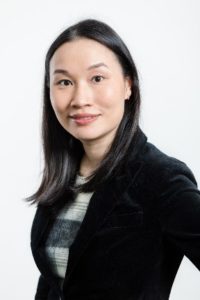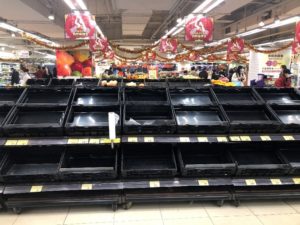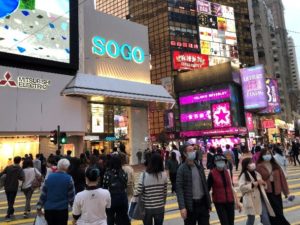Fieldwork in the time of COVID-19
Ann Gillian Chu started her PhD (Divinity) programme at St Andrews in 2018. She was conducting her fieldwork research in Hong Kong when the pandemic struck.
The Development team asked Gillian about her fieldwork research in Hong Kong and the issues she has had to work through for her doctoral project because of Covid-19.

Please describe the research you are undertaking in Hong Kong
My research looks at the ways Christians under a non-democratic regime handle civic engagement through the case study of Hong Kong’s recent resistance movements. Hong Kong has a small but strong Christian community, a sizeable part of which is interested in exploring how their political practice can be reconciled with their Christian identity. The impact of my work will provide a framework for thinking about the intersection of religious identity and civic engagement in non-democratic political orders.
I use ethnographic methods in conducting fieldwork in Hong Kong, which includes field observation and interviews. I am an insider-researcher, meaning that my motivation for this project is owed to the fact that I am myself a Hong Kong Christian. As you may have seen on BBC, the Chinese government has imposed National Security Laws in Hong Kong. The British government responded by granting extended 5-year visas to Hong Kong British National Overseas passport holders so that those who wish to could move to the UK for good. What does it mean to be a Christian in Hong Kong under these current circumstances? I want to think through what this identity means at this important point in Hong Kong’s history, when the role of Christians in Hong Kong society is being challenged by the changing political climate.

What has Hong Kong been like during the pandemic?
Many unexpected events popped up during my field research, such as the US-China trade war, new protests regarding the Anti-Extradition Legislation Amendment Bill, COVID-19, and now the National Security Laws. This experience has been eye-opening for me. It illustrates how life goes on, and every surprise adds a new layer of data to be analysed.
Fieldwork has significantly slowed down since Chinese New Year in January 2020. While the current situation would have been devastating for any outsider-researcher, I am originally from Hong Kong and my family here has seen me through daily difficulties, such as where to get a surgical mask or how to stock up on food. In this sense, being an insider-researcher has been invaluable because, even if everything stands still, when worse comes to worst, I am still spending time with my family.

How did the pandemic impact your research?
My field sites, universities and churches in Hong Kong have been operating on a limited basis since mid-January 2020, coinciding with the Chinese New Year holidays. I was not able to access either location, so I did not make field observations in that sense; however, I observed the unique circumstances as things moved online. Sunday church service is now either on Facebook Live or YouTube, and church fellowship and divinity school classes are now on Zoom. This is sensible for the situation but also dramatically changes my relationship to my field site, which I have moved onto observing from behind a screen.
Since so much social activity has moved online for an extended duration, I begin to wonder if it could supplant the traditional fieldwork paradigm, where we need to be physically present in a local setting, or whether we can simply conduct fieldwork from home? After all, the internet has made what was only locally available now, theoretically, accessible remotely. While the power of face-to-face interactions cannot be replaced or underestimated, I wonder what this online space means for ‘being in the field.’
In the rapidly changing landscape of human-participant research, only certain practical aspects of the work have moved online. My research still consists of engaging a homogenous group that I could not otherwise reach were I not already a part of this community prior to its online existence, and were there not already a reason for them to connect with me. If I had not had an existing relationship with these churches and known their community and liturgy, it would not have made sense for me to connect virtually. Without the connection in the physical world, it is hard to justify the immediate acceptance of virtual connections, especially by those who are not comfortable with virtual environments in the first place.
There is much more thinking to do about my research approaches as I begin the analysis process!
Gillian tweets about Hong Kong, her doctoral research, and the effects of the pandemic. Follow her on Twitter!